-
 bitcoin
bitcoin $109523.663807 USD
-0.13% -
 ethereum
ethereum $4019.526508 USD
2.06% -
 tether
tether $1.000482 USD
0.00% -
 xrp
xrp $2.776815 USD
0.18% -
 bnb
bnb $958.942396 USD
0.12% -
 solana
solana $204.294698 USD
3.84% -
 usd-coin
usd-coin $0.999693 USD
0.00% -
 dogecoin
dogecoin $0.232115 USD
2.09% -
 tron
tron $0.338028 USD
0.84% -
 cardano
cardano $0.790920 USD
1.50% -
 hyperliquid
hyperliquid $44.871443 USD
5.60% -
 ethena-usde
ethena-usde $1.000322 USD
0.04% -
 chainlink
chainlink $21.034165 USD
2.60% -
 avalanche
avalanche $28.794831 USD
-0.54% -
 stellar
stellar $0.360466 USD
1.24%
What is the difference between an ETH wallet address and a contract address? Functional comparison
ETH wallet addresses, starting with "0x" and 42 chars long, are for sending/receiving ETH and tokens, while contract addresses interact with smart contract functions on Ethereum.
May 13, 2025 at 03:42 am
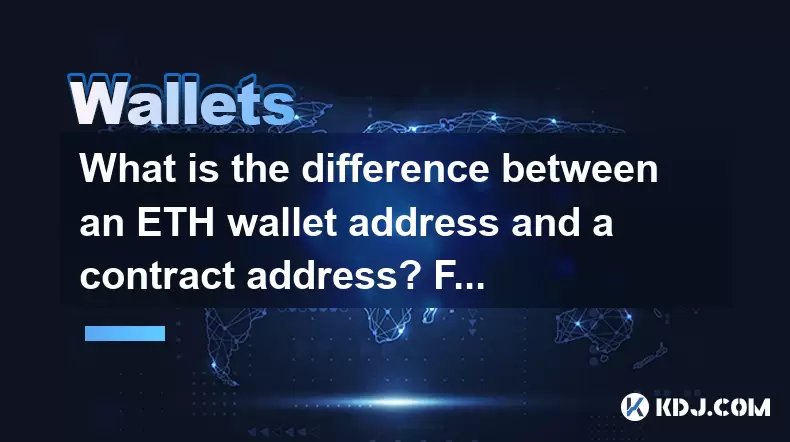
The Ethereum blockchain ecosystem comprises various types of addresses, each serving distinct purposes. Understanding the difference between an ETH wallet address and an ETH contract address is crucial for anyone navigating the crypto space. This article delves into the nuances of these addresses, highlighting their functionalities, structures, and use cases.
Definition and Structure
An ETH wallet address is a unique identifier used to send and receive Ethereum (ETH) and other ERC-20 tokens. It is generated from a public key, which is derived from a private key. The typical format of an ETH wallet address starts with '0x' followed by a string of 40 hexadecimal characters, making a total of 42 characters. For example, an ETH wallet address might look like this: 0x1234567890abcdef1234567890abcdef12345678.
On the other hand, an ETH contract address is used to interact with smart contracts deployed on the Ethereum blockchain. These addresses are also 42 characters long, starting with '0x', but they represent the location of a smart contract rather than a wallet. A contract address is generated when a smart contract is deployed to the Ethereum network. For instance, a contract address might appear as 0xabcdef1234567890abcdef1234567890abcdef1234.
Functionality and Use Cases
The primary function of an ETH wallet address is to act as a destination for transactions. When you want to send ETH or tokens to someone, you use their wallet address. Similarly, to receive funds, you share your wallet address with others. Wallet addresses can be used to:
- Send and receive ETH
- Send and receive ERC-20 tokens
- Interact with decentralized applications (dApps) that require ETH for transactions
In contrast, an ETH contract address is used to interact with the logic and functions of a smart contract. Smart contracts are self-executing contracts with the terms of the agreement directly written into code. They run on the Ethereum blockchain and can be used for various purposes such as:
- Decentralized finance (DeFi) applications
- Token creation and management
- Gaming and collectibles (e.g., NFTs)
- Voting systems and governance
To interact with a contract, users send transactions to the contract address, which then executes the specified function within the contract. For example, to swap tokens on a decentralized exchange, you would send a transaction to the contract address of the exchange, specifying the function to execute the swap.
Creation and Management
Creating an ETH wallet address is a straightforward process. Here's how you can do it:
- Choose a reputable Ethereum wallet provider (e.g., MetaMask, Trust Wallet, Ledger).
- Install the wallet software or connect the hardware wallet to your device.
- Follow the wallet's instructions to generate a new wallet address. This usually involves creating a new seed phrase and deriving the public and private keys.
- The wallet will display your ETH wallet address, which you can use for transactions.
Managing an ETH contract address involves deploying a smart contract to the Ethereum network. This process is more complex and typically requires programming knowledge. Here's a basic overview of how to deploy a contract:
- Write the smart contract code using a language like Solidity.
- Use a development environment like Remix or Truffle to compile the code.
- Deploy the contract to the Ethereum network using a tool like Remix or a deployment script.
- Once deployed, the contract will have a unique address, which can be used to interact with it.
Security Considerations
ETH wallet addresses are secured by the private key, which must be kept secret. If someone gains access to your private key, they can control your wallet and steal your funds. To enhance security:
- Use hardware wallets for storing large amounts of ETH.
- Enable two-factor authentication (2FA) where available.
- Regularly back up your wallet's seed phrase in a secure location.
ETH contract addresses have different security considerations. Since they represent smart contracts, the security of the contract itself is crucial. Vulnerabilities in the contract code can lead to exploits and loss of funds. To ensure the security of a smart contract:
- Thoroughly audit the contract code before deployment.
- Use established security standards and best practices.
- Implement proper access controls and permissions within the contract.
Interacting with Addresses
Interacting with an ETH wallet address involves sending transactions to it. To send ETH or tokens to an address:
- Open your Ethereum wallet.
- Enter the recipient's ETH wallet address.
- Specify the amount of ETH or tokens to send.
- Confirm the transaction and pay the required gas fee.
Interacting with an ETH contract address involves calling functions within the smart contract. This can be done using a wallet or a specialized tool. For example, to call a function in a smart contract:
- Open your Ethereum wallet or a tool like Remix.
- Enter the contract address.
- Select the function you want to call.
- Provide any required parameters.
- Confirm the transaction and pay the required gas fee.
The Ethereum blockchain ecosystem is vast and complex, with various types of addresses serving different purposes. Understanding the differences between an ETH wallet address and an ETH contract address is essential for anyone looking to navigate this space effectively. By grasping their functionalities, structures, and use cases, you can better manage your digital assets and interact with the myriad of applications built on the Ethereum network.
Frequently Asked Questions
Q: Can an ETH wallet address be used to interact with a smart contract?A: Yes, an ETH wallet address can be used to interact with a smart contract. You would send a transaction from your wallet address to the contract address, specifying the function you want to execute. However, the wallet address itself does not contain the logic of the smart contract; it only serves as the sender of the transaction.
Q: What happens if I send ETH to a contract address by mistake?A: If you send ETH to a contract address by mistake, the outcome depends on the contract's functionality. Some contracts may have a function to withdraw the ETH, while others might not. If the contract does not have a mechanism to return the ETH, it could be lost permanently. Always double-check the address before sending funds.
Q: Can a contract address hold ETH or tokens?A: Yes, a contract address can hold ETH or tokens. Smart contracts often have functions to receive and store ETH or tokens, which can be used for various purposes within the contract's logic. However, the contract must be programmed to handle these assets correctly.
Q: Are there any fees associated with interacting with wallet and contract addresses?A: Yes, interacting with both wallet and contract addresses on the Ethereum network incurs gas fees. Gas fees are payments made to miners for processing transactions and executing smart contract functions. The amount of gas required depends on the complexity of the transaction or function call.
Disclaimer:info@kdj.com
The information provided is not trading advice. kdj.com does not assume any responsibility for any investments made based on the information provided in this article. Cryptocurrencies are highly volatile and it is highly recommended that you invest with caution after thorough research!
If you believe that the content used on this website infringes your copyright, please contact us immediately (info@kdj.com) and we will delete it promptly.
- Whales, Trump Coin, and Crypto: A New York Minute on What's Hot (and What's Not)
- 2025-09-27 10:25:17
- SWIFT Tests On-Chain Messaging with Linea: A New Era for Global Finance?
- 2025-09-27 10:25:17
- Binance Coin, WLFI, Crypto Presales: Decoding 2025's Hottest Trends
- 2025-09-27 10:45:15
- MoonBull, Crypto, and Snek Cheems: Navigating the Meme Coin Mania in 2025
- 2025-09-27 10:30:02
- Dogecoin's Rocky Road: Resistance and Price Decline - What's Next?
- 2025-09-27 10:45:15
- Meme Coins: Will Dogecoin and Shiba Inu Ever See Another Boom?
- 2025-09-27 10:50:01
Related knowledge
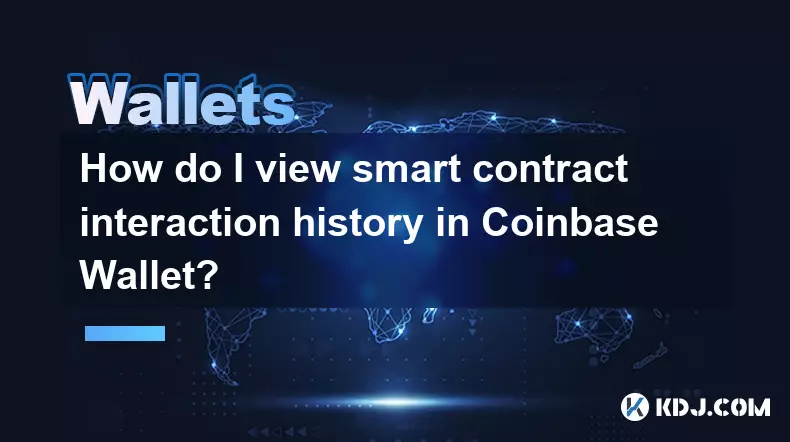
How do I view smart contract interaction history in Coinbase Wallet?
Sep 24,2025 at 01:36am
Accessing Smart Contract Interaction History in Coinbase Wallet1. Open the Coinbase Wallet application on your mobile device and log in using your cre...
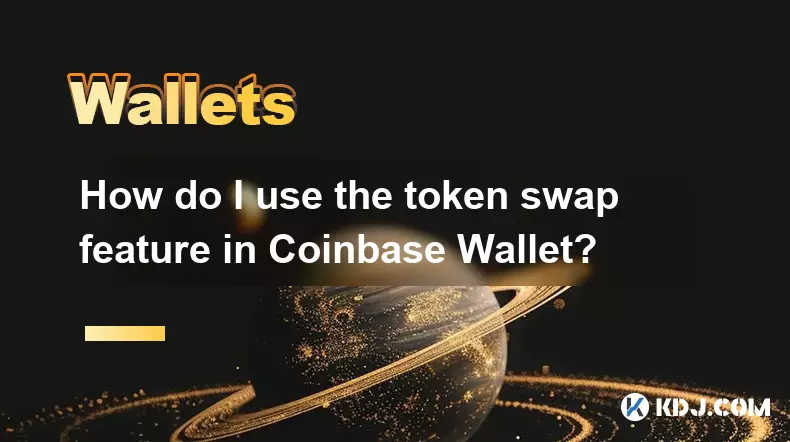
How do I use the token swap feature in Coinbase Wallet?
Sep 24,2025 at 05:00pm
Understanding Token Swaps in Coinbase Wallet1. The token swap feature in Coinbase Wallet enables users to exchange one cryptocurrency for another dire...
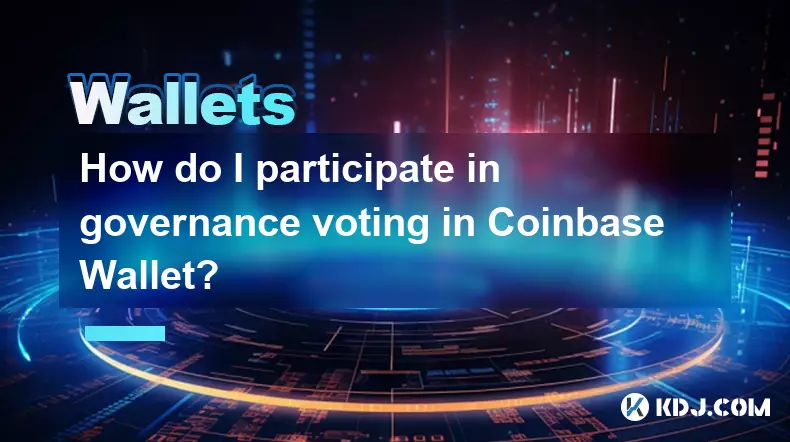
How do I participate in governance voting in Coinbase Wallet?
Sep 25,2025 at 01:55pm
Understanding Market Volatility in the Crypto Space1. Cryptocurrency markets are known for their extreme price fluctuations, often driven by sentiment...

How do I set up a custom RPC node in Coinbase Wallet?
Sep 24,2025 at 12:00pm
Understanding Custom RPC Nodes in Coinbase Wallet1. A custom RPC (Remote Procedure Call) node allows users to connect their Coinbase Wallet to a block...
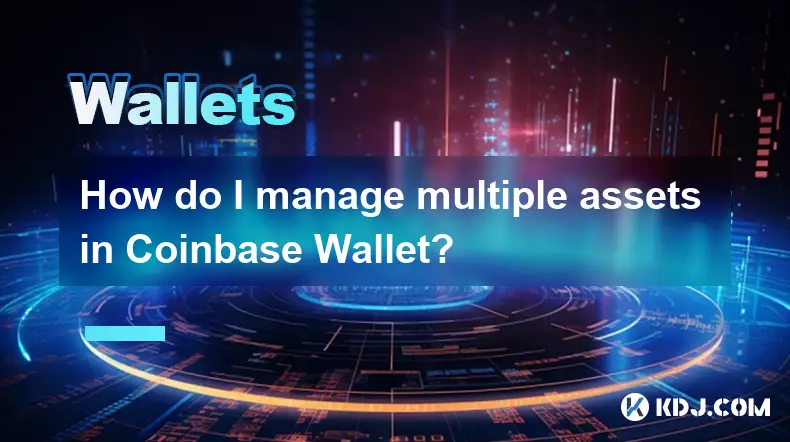
How do I manage multiple assets in Coinbase Wallet?
Sep 23,2025 at 10:00am
Understanding Multi-Asset Support in Coinbase Wallet1. Coinbase Wallet allows users to store a wide variety of digital assets beyond just Bitcoin and ...
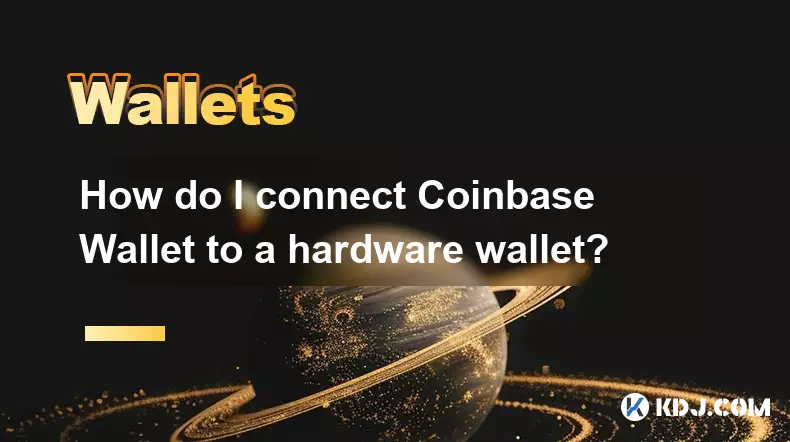
How do I connect Coinbase Wallet to a hardware wallet?
Sep 26,2025 at 02:54am
Connecting Coinbase Wallet to a Hardware Device1. Open the Coinbase Wallet app on your mobile device and ensure it is updated to the latest version. N...

How do I view smart contract interaction history in Coinbase Wallet?
Sep 24,2025 at 01:36am
Accessing Smart Contract Interaction History in Coinbase Wallet1. Open the Coinbase Wallet application on your mobile device and log in using your cre...

How do I use the token swap feature in Coinbase Wallet?
Sep 24,2025 at 05:00pm
Understanding Token Swaps in Coinbase Wallet1. The token swap feature in Coinbase Wallet enables users to exchange one cryptocurrency for another dire...

How do I participate in governance voting in Coinbase Wallet?
Sep 25,2025 at 01:55pm
Understanding Market Volatility in the Crypto Space1. Cryptocurrency markets are known for their extreme price fluctuations, often driven by sentiment...

How do I set up a custom RPC node in Coinbase Wallet?
Sep 24,2025 at 12:00pm
Understanding Custom RPC Nodes in Coinbase Wallet1. A custom RPC (Remote Procedure Call) node allows users to connect their Coinbase Wallet to a block...

How do I manage multiple assets in Coinbase Wallet?
Sep 23,2025 at 10:00am
Understanding Multi-Asset Support in Coinbase Wallet1. Coinbase Wallet allows users to store a wide variety of digital assets beyond just Bitcoin and ...

How do I connect Coinbase Wallet to a hardware wallet?
Sep 26,2025 at 02:54am
Connecting Coinbase Wallet to a Hardware Device1. Open the Coinbase Wallet app on your mobile device and ensure it is updated to the latest version. N...
See all articles










































































